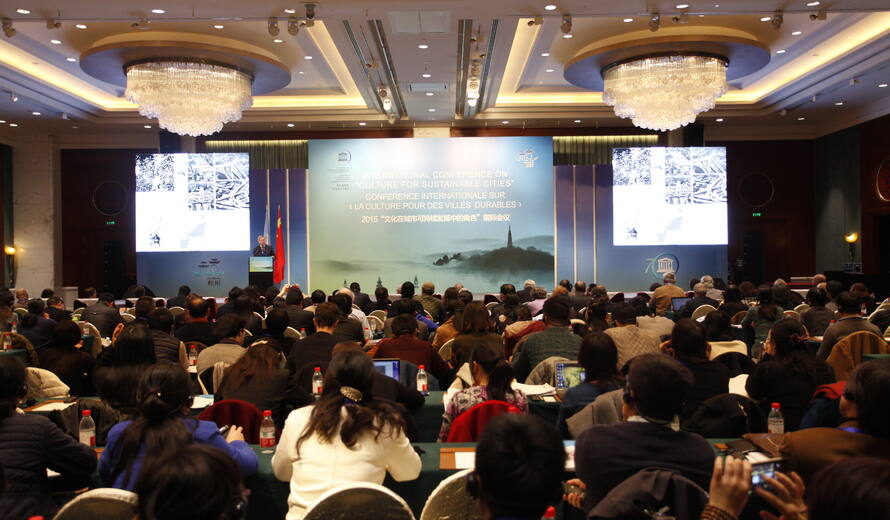International Conference on “Culture for Sustainable Cities” (Hangzhou, People’s Republic of China, 10-12 December 2015)
On 12 December 2015, the participants of the International Conference on “Culture for Sustainable Cities” (10-12 December 2015, Hangzhou, People’s Republic of China) adopted the “Hangzhou Outcomes”, culminating in nine key recommendations to build on the power of culture for sustainable urban development.
The International Conference on “Culture for Sustainable Cities” in Hangzhou, People’s Republic of China, organized by UNESCO from 10 to 12 December 2015, provided a platform to share experiences and propose strategic recommendations to strengthen culture-based sustainable urban development initiatives at the international, national, regional and local levels. On the last day of the conference, the participants adopted a landmark document, the Hangzhou Outcomes, which include nine recommendations to contribute to the elaboration of a “New Urban Agenda” in the context of the implementation of the 2030 Agenda for Sustainable Development and in view of the Habitat-III Conference (Quito, Ecuador, 2016).
Over two and a half days, the meeting brought together some 250 participants, including H.E. Mr Emmanuel Nathi Mthethwa, Minister of Arts and Culture of South Africa, H.E. Mr Guillaume Long, Minister of Culture of Ecuador, H.E. Mr Juan Pablo de la Puente Brunke, Vice Minister of Cultural Heritage, Cultural Industries and the Arts of the Republic of Peru and H.E. Mr Gustavo Meza-Cuadra, Ambassador and Permanent Representative of Peru to the United Nations and Chair of the Group of Friends on Culture and Development. The conference also benefitted from the keynote speeches by Joan Busquets, Wang Shu and Paul Andreu, as well as interventions by mayors and city managers, internationally renowned experts, representatives of the private sector, universities and non-governmental organizations from all regions of the world.
Mr Francesco Bandarin, UNESCO’s Assistant Director-General for Culture, highlighted that “culture is now present in many Sustainable Development Goals [of the 2030 Agenda for Sustainable Development], including the goals to ensure inclusive and equitable quality education, sustained, inclusive and sustainable economic growth, sustainable consumption and production patterns and peaceful and inclusive societies for sustainable development.” Mr Bandarin added that the role of culture is particularly prominent in a dedicated target under SDG 11 on cities and human settlements: target 11.4 on strengthening efforts to protect and safeguard the world’s cultural and natural heritage and that “this is the reason why this Conference is being organized, to explore the prominent role of culture in the urban context. And this is also why we are committed to building the urban agenda for culture and implementing policies in view of Habitat III.” The Assistant Director-General for Culture announced that UNESCO has launched the preparation of a Global Report on Culture and Sustainable Urban Development, in the framework of the UNESCO culture conventions. For the first time, a global report will consolidate strategic analyses and recommendations to foster the role of culture for sustainable urban development, based on founding data and analyses from partner institutions from all regions of the world, and strategic highlights on specific issues collected from key actors in the areas of cultural heritage and creative industries.
In his address, Mr Kumaresh Misra, Deputy Secretary-General of Habitat-III noted that “this conference is happening at a moment when over half of the population is living in urban areas. By 2050, it is estimated that urban areas will accommodate an additional three billion people, representing 70 per cent of the world’s population. So it is the cities that will see the concentration of human population and consequently be an amazing melting pot of all endeavours and activities”. Mr Misra stressed the “wide call for the adoption of culture as a key tool for promoting sustainable urban development; preserving the urban, environmental and cultural identity of cities, enhancing the design and use of the public space as a cultural exchange arena, fostering quality of life and the development of the creative economy, thus contributing to poverty eradication and increasing social cohesion.”
The conference was also an opportunity for UNESCO to showcase the added value of joint cooperation between the Organization’s Culture and Social and Human Sciences Sectors, building on its long-lasting experience and commitment to ensure the sustainability of cities. Mr Francesco Bandarin and Ms Nada Al-Nashif, Assistant Director-General for Social and Human Sciences, seized the opportunity to reiterate the importance of the Cities’ Networks, notably the UNESCO Creative Cities Network and the International Coalition of Cities against Racism and Discrimination.
During the Conference, the strong link between culture, social, economic and environmental development was reaffirmed, as a number of speakers referred to the critical role of culture to enhance the liveability of cities, and empower people to connect with their communities and shape their urban environments. Participants highlighted that the international community and decision-makers should address poverty alleviation and manage economic transitions, notably by enhancing cities’ tremendous cultural assets and human potential. While the need for human scale, compact and mixed-use cities was put forward, several speakers at the Conference pointed to the importance of recognizing cultural diversity by promoting collaborative partnerships to encourage community participation and reduce inequalities. The debates also referred to the essential role of culture for sustainable, green and resilient cities, and the need to enhance linkages between rural and urban settings.
The Conference concluded with the adoption of the Hangzhou Outcomes, which highlighted nine key recommendations to be taken into account in the Global Report on Culture and Sustainable Urban Development and, ultimately, in the elaboration of the “New Urban Agenda” to be adopted at Habitat III in Ecuador, in October 2016.


